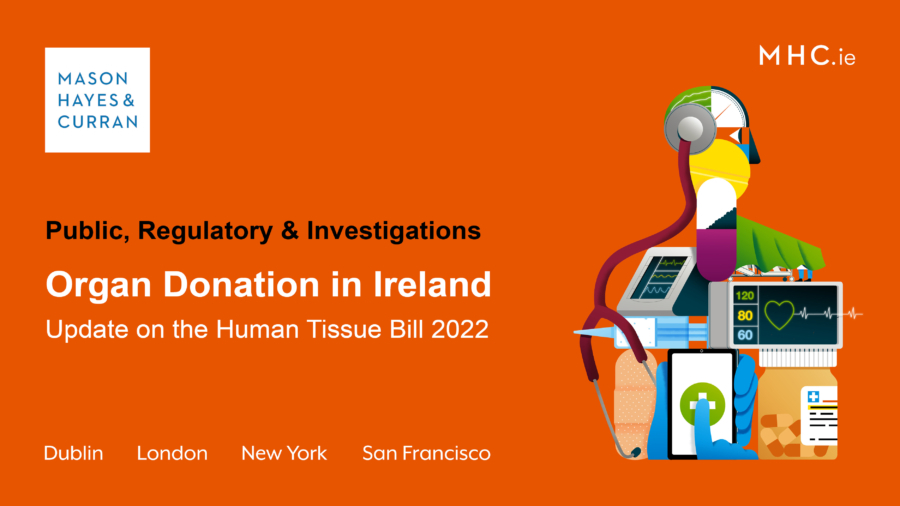
The Human Tissue (Transplantation, Post-Mortem, Anatomical Examination and Public Display) Bill 2022 continues to make its way through the legislative process. Our Public, Regulatory & Investigations team reviews the impact that the Bill in its current form will have on organ donation, practice and procedure for postmortems and core functions and conduct of a coroner.
Organ donation is currently unregulated in Ireland. The Human Tissue (Transplantation, Post-Mortem, Anatomical Examination and Public Display) Bill 2022 (the Bill), in its current form, will introduce an “opt out” organ donation system. This means, in simple terms, that organ donation will be the default position so that there will be a presumption in favour of organ donation unless a person has opted out of the scheme and has registered their objection to organ donation on the Relevant Organ Donation Opt Out Register. However, the Bill allows a family member to override any deemed consent.
The Bill is not without controversy. Some argue that the proposed system, in which deemed consent to donate organs can be overruled by the family of the deceased person, does not go far enough. Others argue that true consent from the donor cannot be obtained in an opt-out system.
Consent requirements
The Bill proposes that a person will be deemed to consent to organ donation, after death, where:
- They have not registered their objection to organ donation on the Register, and
- A registered medical practitioner is satisfied that a designated family member of the deceased person has confirmed that they have no objection to the organ donation
The consent of the deceased person depends on certain conditions being met. These include requirements that the deceased person:
- Has been ordinarily resident in the State for at least 12 months prior to their death
- Had the capacity to understand that consent to donation would be presumed in the event of their death
What is a designated family member?
“Designated family member” is defined in the Bill to include a spouse, civil partner or cohabitant, a child, parent, grandchild, grandparent, uncle or aunt, niece or nephew or a close friend who can demonstrate that he or she can determine and accurately convey the wishes of the deceased person. The designated family member will be determined based on a hierarchy which is set out in the Bill.
Postmortem practice and procedure
The Bill also seeks to regulate practice and procedure for postmortems. A postmortem may be carried out to find out more about an illness, cause of death, for medical research or education and training. This is known as a non-coronial postmortem. Separately, a coroner may order a postmortem in the case of an unexpected death.
Importantly, the Bill introduces a statutory requirement for consent for non-coronial post-mortems. The Bill sets out a framework for how consent should be obtained and the information which must be provided to families to obtain such consent. A failure to obtain appropriate consent will constitute an offence.
The Bill also provides for regulation of the retention, storage, use, disposal and return of organs and tissue from deceased persons following all postmortems in hospital settings, for example, imposing retention periods for records and samples.
Coroners Act amendments
The Coroners Act 1962 is the principal legislation that governs the conduct of coroners. The Coroners (Amendment) Act 2019 strengthened coroner powers in relation to the investigation of deaths and inquests. The Coroners Acts 1962 – 2020 will also be amended by the Bill, to introduce the requirement for communication and information sharing with families where a coronial postmortem is required. This development comes as the Coroners Amendment Bill 2023, which was recently published, seeks to ease pressure on the Coroner Service. The public consultation closed on 19 January 2024 and proposals on changes to the coroner system will now be brought to government.
Comment
By way of next steps, when the Bill was considered in the Seanad Éireann in December 2023, the Minister for Health said that an amendment would be brought forward on Report Stage to align the Bill with the legislation on assisted decision-making. This will require an amendment to both the Bill and the Assisted Decision-Making Acts.
The Bill will be particularly relevant to hospitals and the Coroner Service, as well as charities and other organisations working within the transplant medicine field. For more information on the implications of the Bill, contact a member of our Public, Regulatory & Investigations team.
People also ask
What is the new law on organ donation in Ireland? |
The Human Tissue (Transplantation, Post-Mortem, Anatomical Examination and Public Display) Bill 2022 will provide, for the first time, a national legislative framework for organ donation and transplant services in Ireland. Consent is the cornerstone of this new legislation. |
How many people in Ireland are waiting on an organ donation? |
The 2022 end-of-year figures for transplantation also offer hope to people on transplant waiting lists with 250 on the transplant waiting list, 44 more than in 2021. At any one time in Ireland, there are between 550 and 600 people active on waiting lists for organ transplants including heart, lung, liver, kidney, and pancreas. |
Is Northern Ireland opt-out organ donation? |
All adults in Northern Ireland are now considered potential organ donors unless they choose to opt out or are in an excluded group. |
The content of this article is provided for information purposes only and does not constitute legal or other advice.
Share this:

Catherine Allen
Partner, Head of Public, Regulatory and Investigations
+353 86 382 1009 callen@mhc.ie

